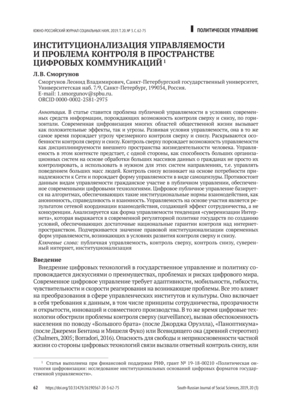Abstract
The article raises the problem of public governability in modern media which entail surveillance and sousveillance. Digitalization in the sphere of public life entails both positive effects and threats. Improving conditions for governability, digitalization simultaneously generates the threat of surveillance and sousveillance. The paper dwells upon the specificity of both. Oversight can result in turning governability into the instrument of ordering people’s life. In this context, governability is a data-intensive instrument that uses the data array processed by large operational systems about citizens. It allows not only to control them but also to use the data to govern and control the behavior of large masses of people. Sousveillance is the result of the need for network belonging and it generates self-censorship as a form of governability. Yet, the citizens’ participation in public administration, backed by modern digital technologies, is opposed to surveillance and sousveillance. Digital public governance is based on algorithms that ensure such institutional norms of interaction as anonymity, justice and reciprocity. Participatory governability is the result of network-based coordination of interaction that creates the effect of collaboration rather than contest. The tendency of “Internet sovereignty” is analyzed as a form of governability, which is expressed in modern regulatory policies of states aimed at creating conditions to provide sufficient national guarantees of control over the Internet space. The paper emphasizes the importance of legal institutionalization of modern forms of governability arising in the context of the development of control from above and from below.
Keywords
Funding information
The research was carried out through the financial support of the Russian Scienсе Foundation, grant No 19-18-00210 “Political ontology of digitalization: Study of institutional bases for digital forms of governability”.
References
Латур, Б. (2018). Политики природы. М.: Ад Маргинем Пресс.
Мрачное будущее интернета: неравенство и несвобода. (2017, 4 августа). Хабр. Режим доступа https://habr.com/ru/company/asus/blog/405783/
Салин, П. (2017). Иерархия равных. Как преодолеть кризис системы международных отношений. Россия в глобальной политике, 5, 129–140.
Сморгунов, Л. В. (2016). Знание и публичное управление: от утверждения нормы к суждению. Политическая наука, 2, 181–197.
Adee, S. (2019, 15 May). The Global Internet is Disintegrating. What Comes Next? BBC: Future Now. Retrieved from http://www.bbc.com/future/story/20190514-the-global-internet-is-disintegrating-what-comes-nex
Asgarkhani, M. (2005). Digital Government and Its Effectiveness in Public Management Reform. Public Management Review, 7(3), 465–487.
Assange, J., Appelbaum, J., Muller-Maguhn, A. & Zimmermann, J. (2012). Cypherpunks: Freedom and the Future of the Internet. N.Y., L.: OR Books.
Bakir, V. (2013). Torture, Intelligence and Sousveillance in the War on Terror. Ashgate: Farnham, Surrey.
Bakir, V., Feilzer, M. & McStay, A. (2017). Introduction to Special Theme Veillance and Transparency: A Critical Examination of Mutual Watching in thePost-Snowden, Big Data era. Big Data & Society, 4(1), 1–5. DOI: 10.1177/2053951717698996
Brokeš, F. (2018, 24 September). Russia’s Sovereign Internet. Central European Financial Observer. Retrieved from https://financialobserver.eu/cse-and-cis/russias-sovereign-internet/
Borradori, G. (2016). Between Transparency and Surveillance: Politics of the Secret. Philosophy and Social Criticism, 42(4–5), 456–464. DOI: 10.1177/0191453715623321
Chalmers, R. (2005). Orwell or All Well? The Rise of Surveillance Culture. Alternative Law Journal, 30(6), 258–261.
Clement, A. (2018, 26 March). Canadian Network Sovereignty: A Strategy for Twenty-First-Century National Infrastructure Building. Retrieved from https://www.cigionline.org/articles/canadian-network-sovereignty
Ganascia, J.-G. (2010). The Generalized Sousveillance Society. Social Science Information, 49(3), 489–507. DOI: 10.1177/0539018410371021
Online Harms White Paper. (2019, 8 April). Retrieved from https://www.gov.uk/government/consultations/online-harms-white-paper
Parés, M., Bonet-Martí, J. & Martí-Costa M. (2012). Does Participation Really Matter in Urban Regeneration Policies? Exploring Governance Networks in Catalonia (Spain). Urban Affairs Review, 48(2), 238–271. DOI: 10.1177/1078087411423352
Recommendation of the Council on Digital Government Strategies. Adopted by the OECD Council on 15 July 2014. (2014). OECD. Retrieved from https://www.oecd.org/gov/digital-government/Recommendation-digital-government-strategies.pdf
Scott, B., Loonam, J. & Kumar, V. (2017). Exploring the Rise of Blockchain Technology: Towards Distributed Collaborative Organizations. Strategic Change, 26(5), 423–428. DOI: 10.1002/jsc.2142
Shen, Y. (2016). Cyber Sovereignty and the Governance of Global Cyberspace. Chinese Political Science Review, 1(1), 81–93. DOI: 10.1007/s41111-016-0002-6
US and UK Refuse to Sign UN’s Communications Treaty. (2012, 10 December). BBC News. Retrieved from https://www.bbc.com/news/technology‑20717774
Xinaris, Ch. (2016). The individual in an ICT world. European Journal of Communication, 31(1), 58–68. DOI: 10.1177/0267323115614487
Wagner, B., Kettemann, M. & Veith, K. (Eds.). (2019). Research Handbook on Human Rights and Digital Technology. Global Politics, Law and International relations. Cheltenham, UK; Northampton, MA, USA: Edward Elgar Publishing.


